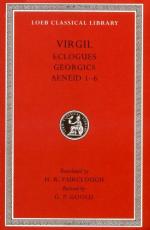|
This section contains 11,480 words (approx. 39 pages at 300 words per page) |

|
SOURCE: “Vergil's Sixth Eclogue and the Problem of Evil,” Proceedings: American Philological Association, Vol. 100, 1969, pp. 407-35.
In the essay that follows, Segal analyzes the moral outlook of the poem and asserts that in the Sixth Eclogue Vergil uses the pastoral mode to point out a correlation between disorder in the universe and man's evil nature.
I
Eclogue 6 is one of Vergil's most ambitious and most difficult short poems.1 Grand themes are its concern: passion, violence, cosmic and poetic creation, the relation between man and nature. No one formulation of the many subtle and complex relationships between these themes is likely to prove definitive, just as no one principle of unity for its bewildering exuberance of narrative material has emerged as entirely satisfactory. “No one can feel confident of exhausting all the possibilities of this poem or of understanding all that Virgil intended: it is the original creation of...
|
This section contains 11,480 words (approx. 39 pages at 300 words per page) |

|


